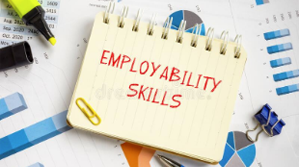



Employability Skills

Employability skills
Employability skills tend to be non-technical skills that help make you an impactful employee. Each job requires some combination of technical and workplace skills (sometimes called soft skills). In other words, you will need to know how to perform the work specific to your role and how to do so effectively. Employability skills tend to refer to the latter—they are workplace skills or transferable skills that help make you an impactful employee, but you can also think of them as skills that employers tend to value. In fact, many employability skills are “higher cognitive skills” that cannot be carried out as automated tasks because they require creativity, critical thinking, and other important social and emotional abilities.
Nine valuable employability skills
It is worth noting that many employability skills draw on one another. For example, being a strong collaborator often means being a proactive communicator with good time management.
- Communication
Communication is a key part of any role. You communicate in various ways at school, including offering solutions to an ongoing problem, supporting peers, sharing ideas in class, and talking to teachers and students. Being an effective communicator is a prized skill because of how wide-ranging it tends to be.
- Critical thinking
There are usually ways to make things function better in the workplace, whether that’s processes, strategies, or even teamwork. Thinking critically and creatively—being an observant individual who asks questions and draws insights that can be used to identify solutions—is a worthwhile skill to hone.
- Problem-solving
Being able to solve problems depends on your ability to think critically and communicate solutions, thus drawing on two other employability skills on this list, and problem-solving is not just a managerial task. It is a skill you can strengthen at any level. Many workplaces appreciate it when you work to uncover a solution rather than simply flag a problem.
- Time management
Managing your time effectively is important. When you do so, you can set and achieve more goals, reduce stress, and stay on track.
- Ability to work independently
When at work, you will often need to work on your own to complete a task or project. Fostering an ability to work without supervision or independently can go far, creating greater trust between you, your team, and your peers. This is especially important for remote work.
- Dedication
Dedication may seem like loyalty to a company, and it certainly can be that in many respects, but it also signals to your employer that you value high-quality work and put in the effort to deliver key results every time. Being a dedicated employee means caring about your work and the standard of that work.
- Collaboration
Collaborating with others is a critical interpersonal skill because many teams must work together to complete projects or achieve results. It is important to know how to work well with others by engaging many other skills on this list, such as communication, time management, and problem-solving.
- Flexibility
The nature of work can change over time. In fact, at many start-ups, change is a given. Remaining flexible in the face of change is a valuable skill to develop and continue working on throughout your career. Flexibility often means staying calm in the face of change, remaining positive, and trying to plan where possible.
- Leadership
You do not have to be a manager to be a leader at work. Leadership skills show that you are proactive, take charge, and think critically about the larger impact of your role. At the managerial level, it shows that you know how to manage a team of employees, ensuring that everyone is working together to complete the tasks at hand.
Further Support
STEMNET Employability skills guide
Creating a CV
Your CV is the first point of contact between you and your next potential employer. It should be succinct and presented in an easy-to-read format using a simple font, minimal styling, and the use of bullet points to break down information. To ensure your CV stands out, follow our recommended structure and tips below:
Start with name, address, and contact details
List your main contact details so prospective employers will be able to reach you easily at any time. Ensure the details are presented clearly and feature prominently at the top of your CV.
Introduce yourself
This is where you should summarise and highlight what you can offer to a prospective employer. Summarise any career highlights that will draw attention to what you have accomplished. It should be tailored for each role you apply for and aim to make you stand out from competition.
Summarise your skills
Use brief bullet points to list the skills and experience you have that are specific and relevant to the role. Hiring managers will scan this section of your CV very quickly to see what you can offer and your suitability for the role.
Tip – wherever possible, use the same adjectives as those used in the advertisement.
Highlight relevant experience
This section should include your work history in most recent historical order including paid work, relevant volunteer work, or work experience placements. It is important to tailor this section of your CV to the job, specifically where key responsibilities in previous roles are applicable for your application.
Tip – highlight how you overcame challenges both personally and as a team member.
Share achievements
Your CV is your opportunity to sell yourself and highlight why you are the best fit for the role, so it is important to include where you have gone beyond or made a significant achievement.
List any training, education, and courses
Only list what is relevant or required for the role you are applying for, starting with the most recent. It is important to highlight where you may have up skilled or could bring new knowledge to the organisation.
References are available on request
It is fine to list references available on request if you are not comfortable disclosing your referees until further into the recruitment process. It is important to make sure you have them readily available and contactable when requested.
Final top five tips
- Use the right ‘keywords’ to ensure your CV is picked up in word searches
- Explain any gaps in your CV, and be sure to highlight the skills that you have developed
- Do not include acronyms or organisation related terminology
- Include two forms of contact, email and mobile
- Ensure you check your CV thoroughly for any spelling and grammar errors. Consider having a friend or family member check it over for you as well
Common Interview questions: How to answer
Practice your answers to some of the main interview questions often asked.
About the employer
Employers want to see that you have a genuine interest in working for them by asking questions like:
- What do you know about our company?
- Why do you think you are a good fit for our company?
- Why do you want to work for us?
To prepare for questions about the employer, you need to research the company. You should look at their website and ‘about us’ pages to find out more about their products, services, and values. Show what you have learned about the company throughout the interview.
About you
Employers will want to get to know you and may ask things like:
- What do you do in your spare time?
- What are your hobbies and interests?
Show what kind of personal qualities, interests, and skills you have. For example, you could talk about:
- Cooking – to show you are organised and can follow instructions
- Travel – to show you are adventurous and flexible
- Team sports – to show you are a team player with effective communication
- Music – to show you are creative
If the job requires certain skills, you should demonstrate these in your examples, for example, if it is a graphic designer role, you could talk about taking a desktop publishing course.
Work history questions
Employers usually base questions on jobs you have done in the past. This gives you the chance to talk about your experience. For instance, they might ask:
- When have you faced a challenging situation?
- Can you tell us about a personal achievement at work?
- Have you ever taken the initiative?
- Have you ever failed at a task?
Your answers should reflect the skills the employer wants. Be positive and tailor your examples to the job description. If you do not have much work history, you can use examples from outside of work. You can also use examples from volunteering experience.
Strengths
The strengths employers look for will depend on the job role. They may ask you questions like:
- What are your main strengths?
- Why should we hire you?
You can use specific examples to highlight your strengths, such as:
- Communication – to show you get on with others
- Problem solving – to show that you can find solutions
- Enthusiasm – to show that you have a positive attitude to work
- Flexibility – to show that you can adapt to different ways of working
Plan your answers around 2 or 3 examples that are relevant to the job. You can back these up with qualifications or training you have done.
Weaknesses
You should be honest when answering questions about your weaknesses. Say how you are working to improve them.
Example
Question – “Do you have any weaknesses?”
Answer – “I struggle with time management on projects. To make sure I stick to the time frame I create a timetable of steps at the start of each project”.
Ask questions
At the end of a job interview, employers will usually ask if you have any questions for them. This is a good chance to show your interest in the company and your enthusiasm for the job.
For example, you could ask:
- What is it like to work here?
- What does a typical day involve?
- How do you see the company developing over the next few years?
- Will there be any training opportunities after I start?
Why you left your last job
The employer may ask you questions about leaving your last job. If you have been out of work for a long time, explain why. Talk about the positive things you have done while away from work. For example, networking, retraining, volunteering, or keeping fit.